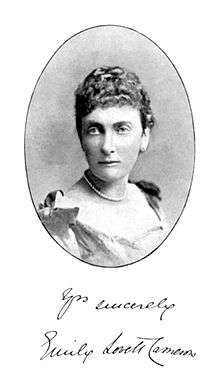Mrs. Lovett Cameron
| Mrs. Lovett Cameron | |
|---|---|
 Emily Lovett Cameron | |
| Born |
1844 London, England |
| Died |
1921 (aged 76–77) Kensington, England |
| Spouse(s) | Henry Lovett Cameron |
| Children | 2 |
Mrs. Lovett Cameron or Caroline "Emily" Sharp (1844 – 1921) was a British romantic fiction author. She wrote more than fourteen three-volume novels.[1]
Life
Caroline Emily Sharp was born in 1844[2] in London to a well-off family who began her education by sending her to Paris at the age of six to learn French. In France she stayed in the Rue de Concelles with the Nizard family. Mr. Nizard later went on to be a French senator. She went to boarding school in England and then returned home. Her requests to become a writer were denied, despite the evidence that she preferred writing to needlework. At some time she and two of her brothers started a publication called the City Advertiser but it was discontinued after six months.[1]
Marriage
She married Henry Lovett Cameron who was a parliamentary agent in the Treasury in 1867. Her brother-in-law was Verney Lovett Cameron who was an explorer.[3] Her own brother taught her to canoe and to scull.[1]
At her husband's instigation she started to write, achieving moderate success with her first novel, Juliette's Guardian, which was published in a magazine[1] and then as a book in 1877.[3] This melodrama dealt with the affair between the 17-year-old Juliette Blair and her guardian Colonel Fleming.[4] Lovett Cameron worked to a daily timetable, writing over forty books between 1877 and 1905.[1][5] A later novel, In a Grass County, went to a ninth edition. The formula of her novels dealt with a relationship that hints at the emerging risk of sex and sin, but the narrative then backs off to deal with the emerging love and romance.[3]
By the 1880s her brother-in-law, Verney, also took to writing, but he published books for boys.[3]
She was known as "Emily"[4] but she wrote under the name of "Mrs. Lovett Cameron". In 1891 she contributed a chapter to the unusual novel The Fate of Fenella, a three-volume novel created without discussion by twelve male and twelve female writers, including Bram Stoker and Arthur Conan Doyle.[6]
Lovett Cameron's approach emphasised domesticity and the married woman's role. She was not a "New Woman" and her writings denigrated women of such a persuasion.[4] In 1895 The Triumph of a Snipe Pie, better known as The Man who Didn't, was published.[3] This story describes how a married man successfully resists the guiles of another woman. The book's title echoed the scandalous story The Woman Who Did by the Canadian writer Grant Allen which portrayed a "New Woman" favorably.[3] Allen's book told of Herminia Barton, a woman who opted for "free love" because she refused to be a slave to any man.[7]
Cameron's last published novel was 'Rosamond Grant' (1905).[5] She died at her home in 1921.
References
- 1 2 3 4 5 Bassett, Helen C. Black ; edited by Troy J.; Pope, Catherine (2011). Notable women authors of the day (New ed.). Brighton: Victorian Secrets. pp. 109–112. ISBN 1906469202.
- ↑ Bassett, Helen C. Black ; edited by Troy J.; Pope, Catherine (2011). Notable women authors of the day (New. ed.). Brighton: Victorian Secrets. p. 339. ISBN 1906469202.
- 1 2 3 4 5 6 Mrs Lovett Cameron, OxfordIndex.oup.com, retrieved 23 February 2014
- 1 2 3 Mrs. Lovett Cameron, Valan Court Books, retrieved 22 February 2014
- 1 2 British Library Catalogue
- ↑ Fate of Fenella, The Spectator, May 1892, retrieved 22 February 2014
- ↑ Greenslade, ed. by William; Rodgers, Terence (2005). Grant Allen : literature and cultural politics at the Fin de Siècle ; [... papers delivered at a Conference 'Grant Allen and Cultural Politics at the Fin de Siècle' which was held on 13 November 1999 ; held in the Faculty of Humanities at St. Matthias Campus, University of the West of England]. Aldershot, Hants: Ashgate. p. 81. ISBN 0754608654.
External links
- Works by or about Mrs. Lovett Cameron at Internet Archive
- Works by Mrs. Lovett Cameron at LibriVox (public domain audiobooks)

- Works by Mrs. Lovett Cameron at the Open Library